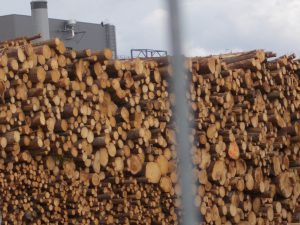Amsterdam, 8th May, 2020 – Today’s publication of a long-awaited biomass report by the Netherlands Environmental Assessment Agency has been greeted with alarm by international environmental organizations [1] who denounce it for failing for biomass subsidies in the face of strong evidence that those harm forests and the climate.
The report, entitled “Availability and Sustainability of Biomass”[2], which is meant to inform a forthcoming policy review headed by the Netherlands’ Social and Economic Council, acknowledges that the Dutch biomass certification scheme cannot guarantee that subsidised wood burning for energy is low carbon and causes no harm to forests and wildlife. It cites from various studies which conclude that large-scale burning of wood for energy is not compatible with limiting global warming to 1.5 degrees, the goal of the Paris Agreement. Nonetheless, the authors conclude that a climate policy without a significant role for biomass would be “risky” and that it was “advisable to invest in sustainable biomass production”, in other words, to continue promoting the expansion of biomass energy, whilst continuing to monitor its impacts and considering whether different sustainability standards might be introduced, justifying this conclusion with scientific uncertainties and claims .
In 2018, 800 scientists signed an open letter to the EU warning that cutting down trees for energy will increase CO2 in the atmosphere and warming for decades or centuries, even when this action replaces fossil fuels, regardless of how sustainable the forest management is.[3] The European Academies’ Science Advisory Council (EASAC) has come to a similar conclusion and has called for international action to restrict support schemes for forest biomass energy.[4] Furthermore, evidence collected and published by environmental NGOs and investigative reporters shows that in both the southern USA [5] and Estonia [6] – two of the pellet supply regions for the Netherlands – wood for pellets is routinely sourced from the clearcutting of wildlife-rich forests. In the southern US, in many cases those are bottomland hardwood forests that lie at the heart of a global biodiversity hotspot.
Almuth Ernsting from Biofuelwatch states:
Almuth Ernsting from Biofuelwatch states: “We are deeply disappointed that the Environmental Agency report endorses further support for expansion of biomass energy despite listing a host of studies and reports which show that the climate impacts of cutting down and burning trees for energy is no better than those of burning coal. The authors are using “uncertainties” and lack of consensus as a reason to embrace more ‘business as usual’ biomass energy, whilst recommending more monitoring, research and consideration of changes to sustainability standards which haven’t been shown to have had any impact in the first place. This is the opposite of the precautionary principle to which the Netherlands and the EU have signed up to.”
Rita Frost from US forest protection NGO Dogwood Alliance explains: “Every year since 2013, we have observed Enviva, the world’s largest pellet producer and a supplier of RWE Netherlands, sourcing whole trees from what once were beautiful natural forests The Netherlands is subsidising forest destruction through taxpayers’ money, and this needs to stop.”
Siim Kuresoo from Estonian Fund for Nature adds: “In Estonia, logging rates and practices are causing serious harm to our forests and to the wildlife that depends on them, such as Flying squirrels, Black storks and many other birds. We are deeply disappointed that the authors of the report are supporting policies which will worsen the situation for forests in our country, despite the evidence we and others have sent to them.”
Sasha Stashwick, a Senior Advocate for NRDC’S Climate & Clean Energy program said: “Not only does burning biomass pollute the climate just like fossil fuels, but the industry’s devastating impacts on critical ecosystems and surrounding communities are well-documented. Instead of wasting taxpayer resources subsidizing a dirty and destructive power source the Dutch government should invest in clean, reliable and inexpensive wind and solar energy.”
Contacts:
- Rita Frost, rita@dogwoodalliance.org, Tel +1 512 423 0620 (USA)
- Siim Kuresoo, siim@elfond.ee, Tel 372 56 469 026 (Estonia)
- Almuth Ernsting, biofuelwatch@gmail.com, Tel +44-131-6232600 (UK)
- Sasha Stashwick, slyutse@nrdc.org, Tel +1 347 237 6685 (USA)
Notes:
[1] The press release is being sent by Dogwood Alliance (dogwoodalliance.org), Natural Resources Defense Council (nrdc.org), Partnership for Policy Integrity (pfpi.net), Estonian Fund for Nature (elfond.ee), Fern (fern.org) and Biofuelwatch (biofuelwatch.org.uk).
[2]The report, which can be found at https://www.pbl.nl/publicaties/beschikbaarheid-en-toepassingsmogelijkheden-van-duurzame-biomassa-verslag-van-een-zoektocht-naar-gedeelde-feiten, provides information and advice to the Netherlands’ Social and Economic Council, which in turn will advise the government on a new Dutch sustainability framework for biomass. Scientific publications and research in the field of availability, applications and certification of biomass have been assessed by the Environment Assessment Agency ( PBL) in the report. The PBL report justifies the continuation of the current Dutch policy in which biomass combustion in coal-fired power stations and biomass-fired power stations will continue to hold a large share.
[3] pfpi.net/wp-content/uploads/2018/04/UPDATE-800-signatures_Scientist-Letter-on-EU-Forest-Biomass.pdf
[4] easac.eu/fileadmin/PDF_s/reports_statements/Carbon_Neutrality/EASAC_commentary_on_Carbon_Neutrality_15_June_2018.pdf and onlinelibrary.wiley.com/doi/10.1111/gcbb.12643
[5] See for example dogwoodalliance.org/wp-content/uploads/2019/07/Biomass-Investigation-Booklet-2019.pdf, nyheder.tv2.dk/samfund/2019-09-09-tv-2-afsloerer-fejl-i-klimakontrol-helt-sort-siger-ekspert and reports.climatecentral.org/pulp-fiction/2/

